Bergen is a popular stop on Norwegian fjords cruise itineraries and your operator will gladly sell you a guided day trip. However, the former capital of Norway is a very easy place to explore independently.
So what should you see if you only have one day in Bergen on a cruise stop?
To help you make the most of your day there, here are the best things to do in Bergen weaved around a one-day itinerary.

My Suggested 1-Day Bergen Itinerary
To help you make the most of your time in port, here is the 1-day Bergen itinerary I followed. If you have more time here or are looking for alternative activities, I’ve also included a few bonus things to see in Bergen.
Ride the Fløibanen funicular
For panoramic views over Bergen and awesome nature trails
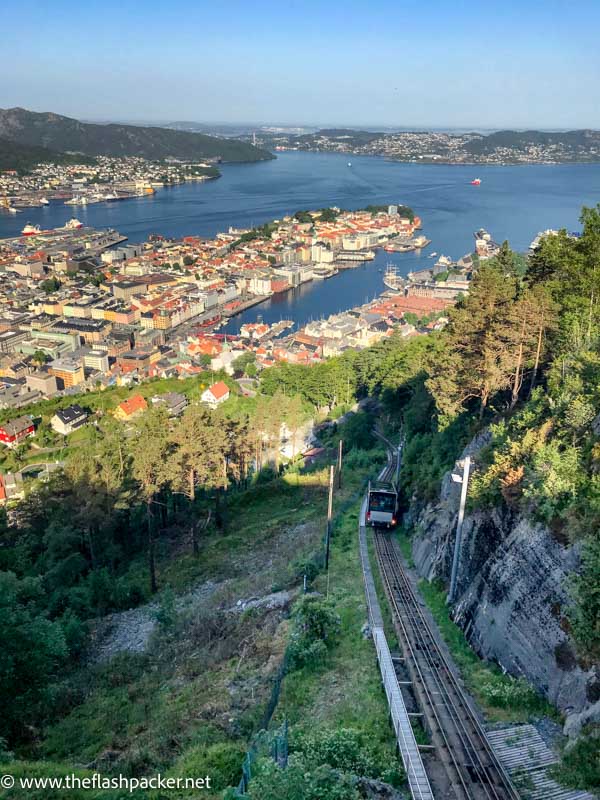
Start your day in Bergen by taking a ride on the Fløibanen funicular. This whisks you to the summit of Mount Floyen, 320 meters above sea level in less than seven minutes.
Treat yourself to panoramic views over Bergen and explore the abundance of clearly marked nature trails. But watch out for the witches!
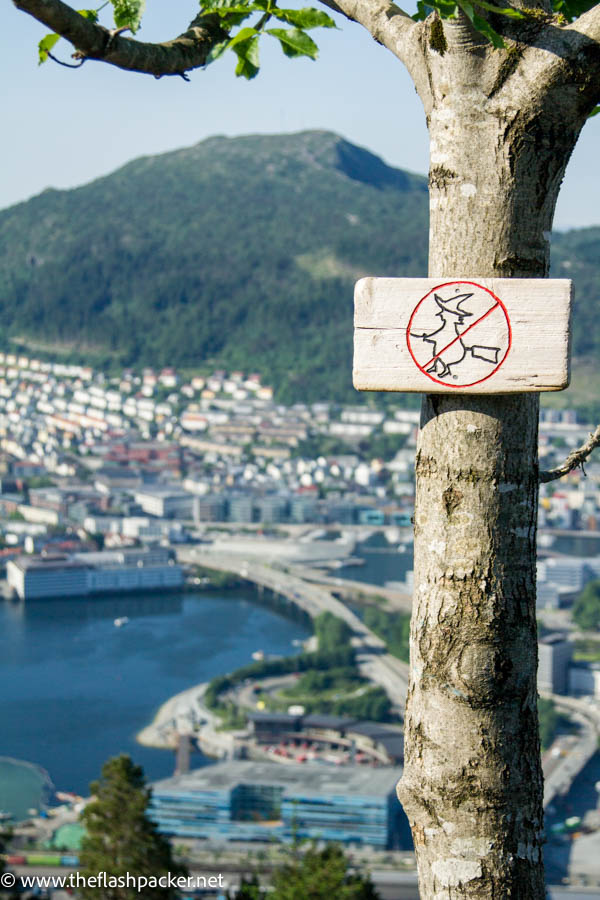
Although the exact number is not known, it is believed that from 1560 until around 1700 there were up to 1400 witch trials in Norway. Favoured methods of torture and execution included the rack, boiling sulphur and burning.
Before moving away from the summit, make sure that you say ‘hallo’ to the goats. Mount Floyen is home to Kashmir goats. Elvis was particularly becoming.

Next, take the 1.6km loop to Skomakerdiket, with its crystal-clear lake.
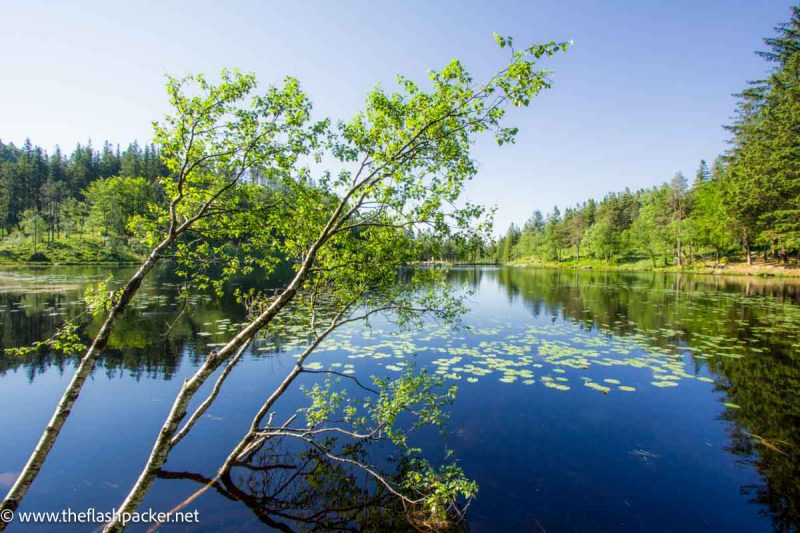
After doing a circuit of this lake, wind your way through forest trails, to the soundtrack of birdsong, before descending a series of steps to the Bryggen neighbourhood and the funicular’s terminus.
Explore historic Bryggen
For a picture-perfect ensemble of stone and timber buildings.
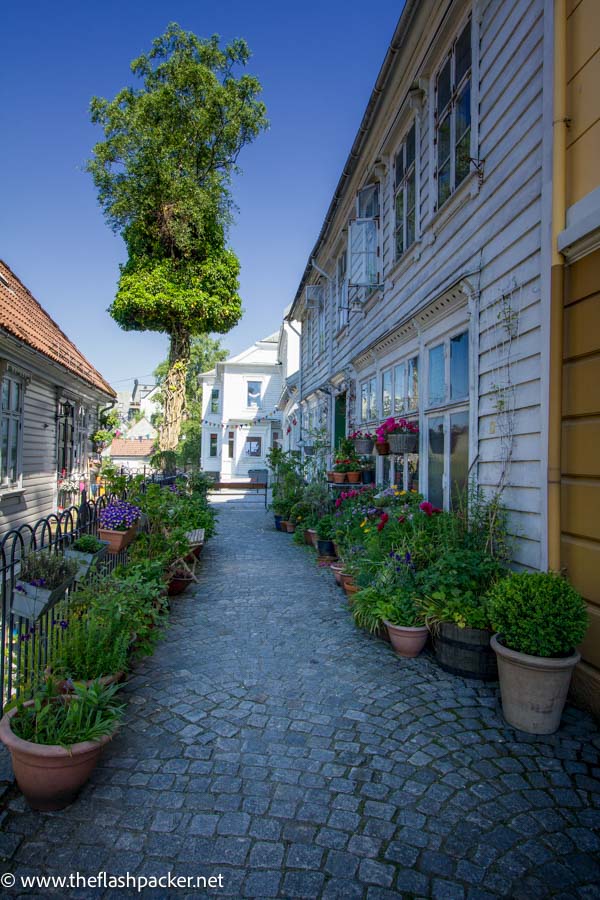
With its closely packed, brightly painted wooden buildings sitting alongside stone warehouses, Bryggen is the historic trading centre of Bergen. In recognition of its historical importance, this has been a UNESCO World Heritage Site since 1979.
In the 14th Century, the city became one of the parts of the German Hanseatic League, a commercial and defensive confederation of merchant guilds and market towns in Central and Northwestern Europe. The Hansa merchants reigned supreme for 200 years and, as a result, Bryggen and Bergen flourished.
A devastating fire in 1702 laid waste to many of Bryggen’s medieval buildings. The replacement wooden warehouses were subsequently demolished to make way for the brick and stone buildings we see today. However, these buildings are sympathetic to the Hansa period style and many of the 18th Century timber buildings have survived.
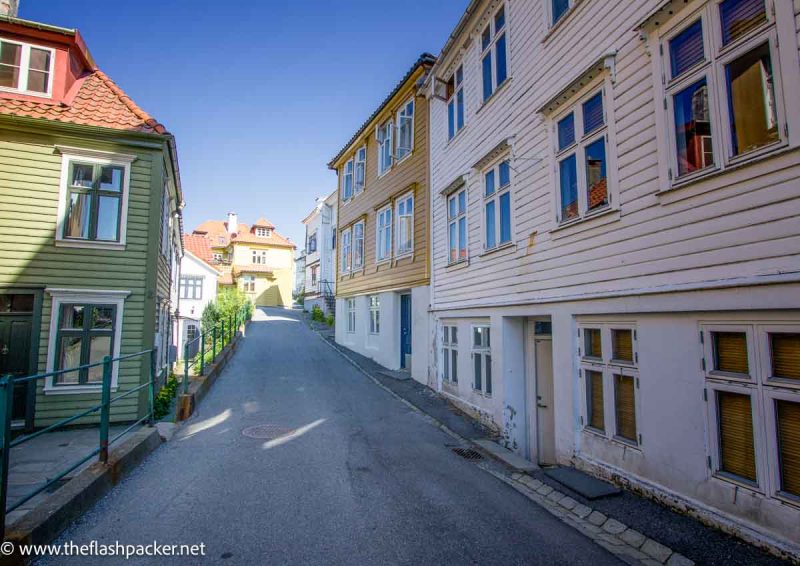
Today, many of these buildings are home to shops and restaurants. So, if you are in the market for that perfect Nordic Sweater, this is where to go.
Bryggen stretches down the eastern side of the harbour and finishes at the Torget, Bergen’s main square.
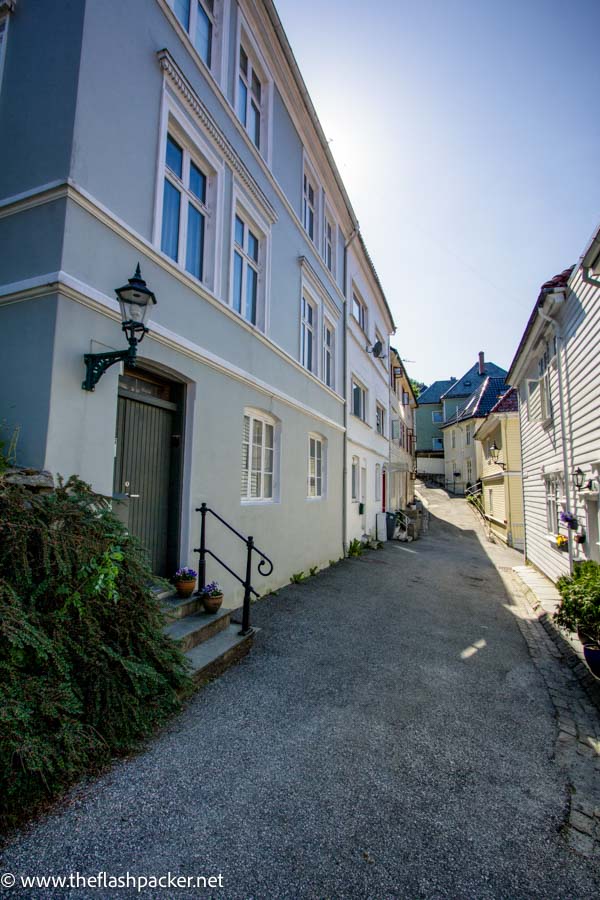
Target the Torget
For something a bit fishy.
Although fish is the main order of the day in the market at Bergen’s Torget, it also sells fruit, vegetable and souvenirs. It is a great place to eat fish and seafood for a not-too-outrageous price.
In 1556, the Fish Market was moved from the Nikolaikirkeallmenning, in nearby Bryggen, to prevent the Hanseatics from gaining too much power over Bergen’s most important trading place. As Bergen’s Fish Market increased in size and importance, this precipitated a construction boom in the area, with a large number of buildings dating from the 1700s and 1800s.
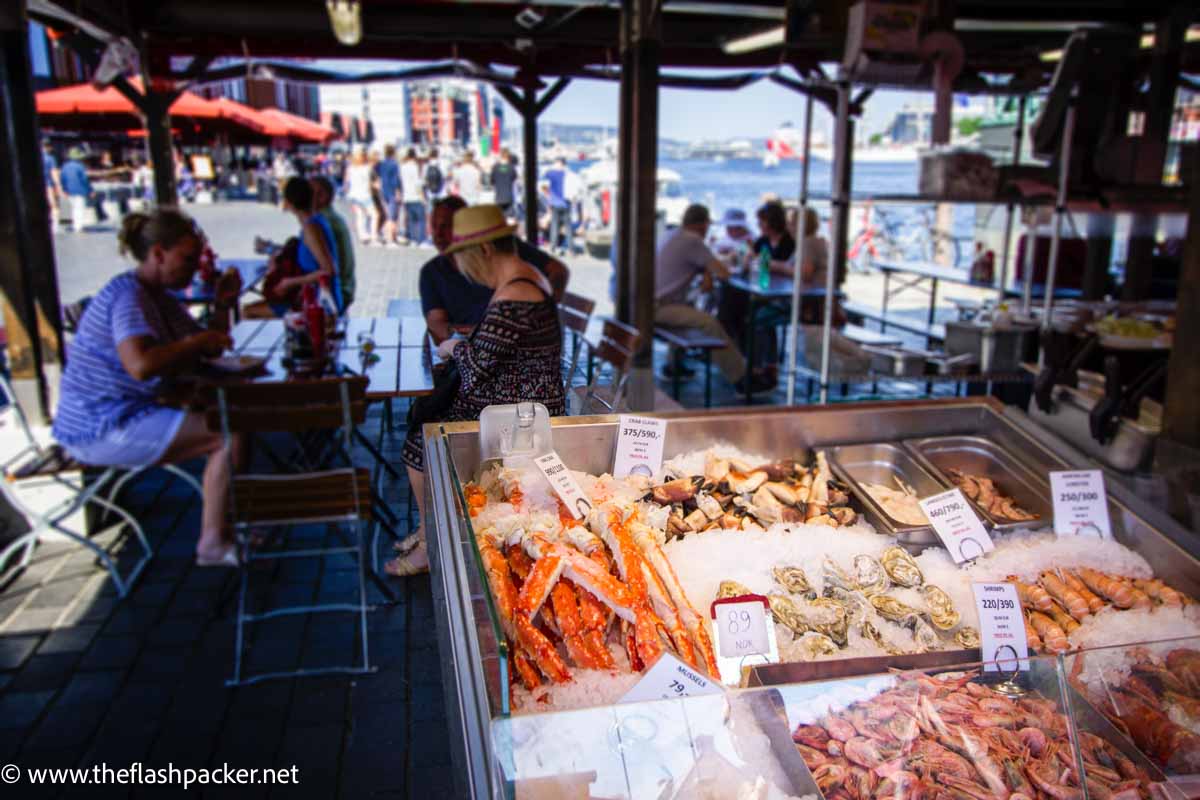
Check out Bergen’s street art AROUND Kong Oscarsgate
For a funkier side to Bergen.
Heading east from the Torget, Kong Oscarsgate is a particularly unlovely main thoroughfare. However, it is home to the Domkirke, Bergen’s cathedral, and its side streets provide the canvas for an eclectic collection of street art.
Go to this resource to find the city’s best street art.

Visit the Leprosy Museum
To learn about the story of Norway’s fight against leprosy.
Between 1850 and 1900, Bergen had the largest concentration of patients with leprosy in Europe. The museum is housed in St Jorgen’s Hospital, which specialised in the care of lepers until it shut its doors in 1946.
The patients’ living quarters have been left as they were, and you can also view their paintings and life stories. A moving memorial to this group of people marginalised by society.
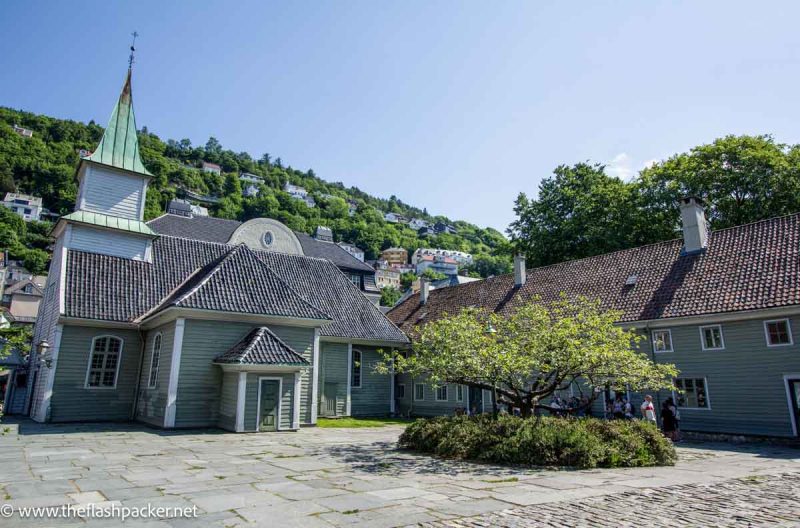
Bergen’s Leprosy Museum is located at Kong Oscarsgate 59. It is open daily during the summer months (May to September) and you can check the opening hours here.
When I visited, the display information was mainly in Norwegian, but the helpful staff will give you English language booklets.
Visit the Bergenhus Festning Museum
To discover the story behind the resistance in Bergen during World War II.
This friendly and free museum at the entrance to the harbour is dedicated to the resistance movement, both civilian and military, during the Second World War. Make your way to the first floor where the history of the resistance is explored through well-composed displays, which include photos, weapons and espionage equipment.
The resistance was particularly strong in Bergen and the German occupation forces fought against it with all of their might. This included torturing the city’s citizens before their execution or dispatch to concentration camps. Despite this, the movement continued to grow in strength, a testament to the fortitude of Bergen’s people.
Admission is free. When I visited, water, tea and coffee were available free of charge
Visit the Rosenkrantz Tower & King Hakon’s Hal
For a dose of medieval splendour.
Finish your 1-day Bergen itinerary with a visit to the Rosenkrantz Tower, one of the best-preserved fortresses in Norway. But perhaps more compelling is the adjacent Hakonshallen (King Hakon’s Hall), a medieval royal residence and feasting hall.
Opening hours here. As the opening times for Hakonshallen are limited, check ahead.
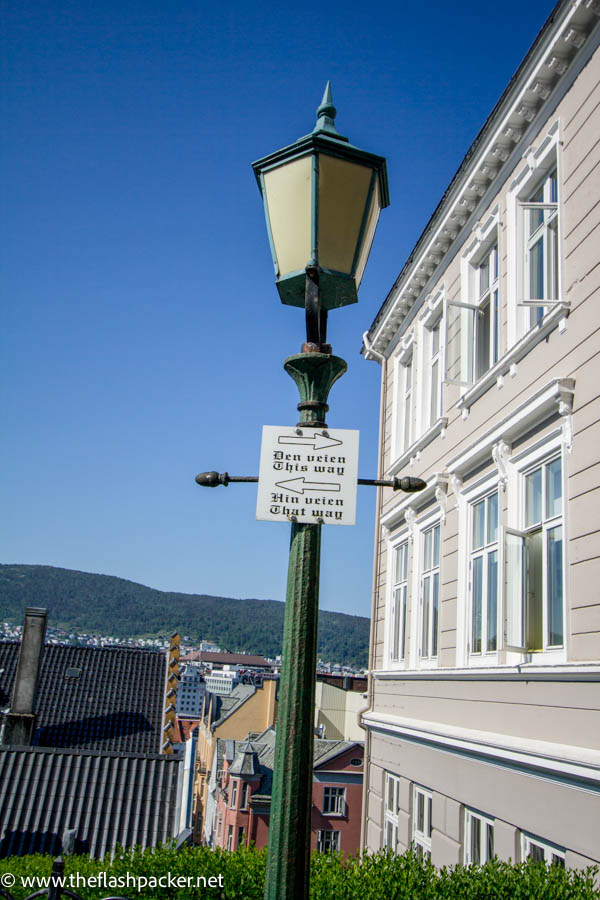
More Than a Day in Bergen? Here Are Other Things to Add to Your Itinerary
Hanseatic Museum
Bergen’s Hanseatic Museum, newly rehoused in Schøtstuene, traces the life and history of the town’s Hanseatic merchants.
KODE Art Museum and Composers’ Homes
This cluster of seven buildings houses 50,000 artefacts relating to art, craft, design and music. These objects are exhibited in the four buildings in the centre of Bergen (KODE 1,2,3,4) and in the three buildings which were the homes of the composers Ole Bull, Harald Saeverud and Edvard Grieg.
The museums are open for much of the year. Check the website for locations, opening times and ticket prices for KODE Art Museum and Composers’ Homes
The final two things to see in Bergen are a short distance outside the centre of the city.
Edvrad Grieg’s home (Troldhaugen)
Built in 1885, Troldhaugen was home to Nina and Edvard Grieg for the last 22 summers of the composer’s life. It became a museum in 1928 and is also where the Griegs are buried.
To reach Edvard Grieg’s home, take the light rail from Bergen city centre, direction “Bergen Lufthavn” and leave the train at the station “Hop”. From there, it’s around a 25-minute walk (follow the signs for “Troldhaugen”). On weekdays you can also take bus no. 53 or 67.
Visit the Fantoft Stave Church
Due to the light rail being out of action when I visited Bergen, I was not able to visit the Fantoft Stave Church. I was gutted. A stave church is a Norwegian must-see in my book, and this was the only accessible one from my fjords cruise.
Stave churches are medieval timber buildings with carvings combining Christan motifs with Viking themes. Although the Fantoft Stave Church is a replica of the 12th Century original that burnt down in 1992, I still feel that it is worth visiting.
To reach the Fantoft Stave Church, take the Light Rail from Bergen city centre and get off at “Fantoft” station. From there it’s around a 10-minute walk. It is open in the summer months only.
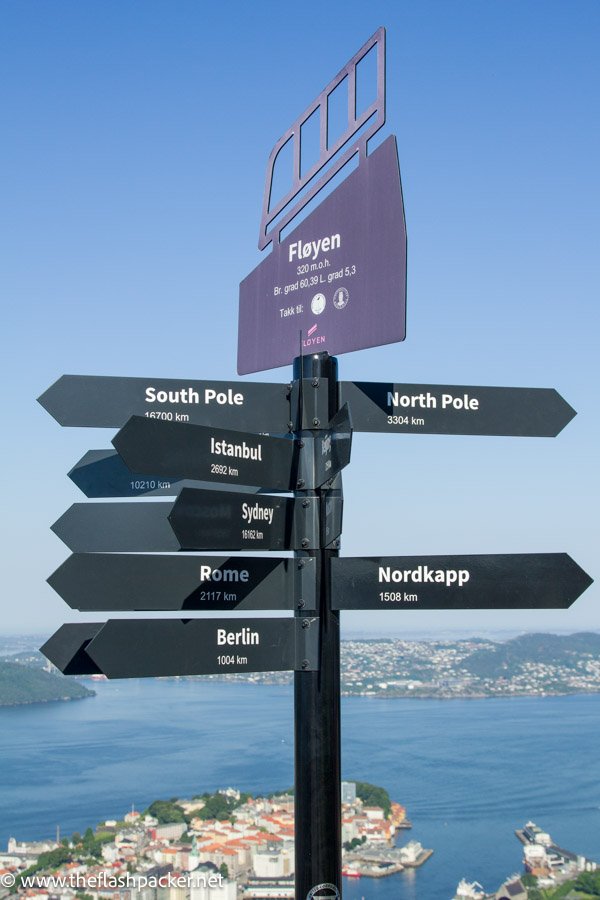
Is the Bergen Card worth it?
For ease of use, you might consider getting your hands on the Bergen Card, a golden ticket to the city’s cultural delights and free city transport. This is available for 24 hours, 48 hours or 72 hours.
Do the maths before you buy it. As I spent less than a day in Bergen, it was not a good buy for me. Compare its cost with what you are likely to pay on admission fees over the specified duration.
How I Visited Bergen on a Cruise
I sailed with P&O on HMV Britannia. We were in port from 8 am until 5 pm.
Getting to Bergen’s city centre from the cruise terminal was easy, a pleasant 15-minute walk to the Torget.

Enjoy your day in Bergen
It’s one of Norway’s most scenic cities.
If you have found this article helpful, take a look at my guides to the other stops on this Norwegian Fjords cruise.
- 10 Awesome Things to Do in Stavanger in A Day
- Alesund, Norway: An Art Nouveau Walk in a Fairytale Town
- Visiting Flam on a Cruise: The Flam Scenic Railway and More!
Finally, if you are a cruise rookie, I also have advice on how to choose your first cruise and guidance on cruise cabins, including the lowdown on single staterooms for those cruising alone.

About Bridget
Bridget Coleman has been a passionate traveller for more than 30 years. She has visited 70+ countries, most as a solo traveller.
Articles on this site reflect her first-hand experiences.
To get in touch, email her at hello@theflashpacker.net or follow her on social media.
